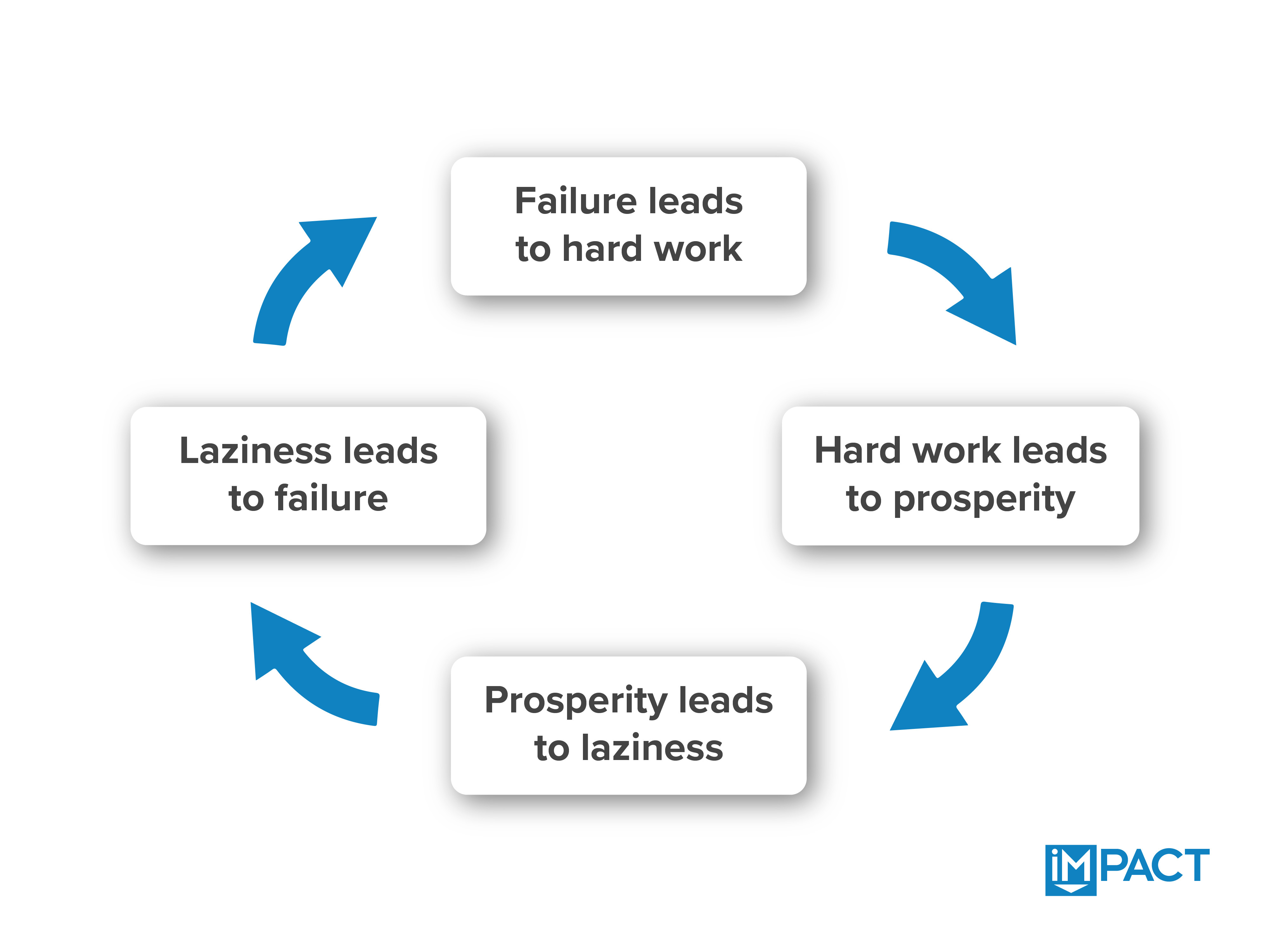Subscribe now and get the latest podcast releases delivered straight to your inbox.
For far too long, marketing has been seen as a business expense.
When times get tough and budgets shrink, the marketing team (and the marketing budget) are generally the first to go. Simultaneously, when business is booming and it's time to grow, businesses often hire sales reps first.
All of this is exacerbated by one huge problem: It can be hard to accurately measure the return on investment (ROI) of your marketing efforts. If the results are hard to measure, the value is easier to dismiss.
But choosing to view marketing as an expense that can be cut is a short-sighted approach, and it can lead a business into dangerous territory.
Marketing is what ensures the future success of your business. If you're not continually investing in marketing, you might be creating your own crisis — maybe not in the short term, but sooner than you'd think.
Instead, you need to commit to investing in marketing every month, when your business is booming and when your phone goes silent.
Below, I’ll cover:
- Why even word-of-mouth businesses need to invest in marketing.
- Establishing a “minimum standard of excellence.”
- How today’s marketing activities set you up for long-term success.
Beware: Success can breed laziness
When companies are bringing in more leads than they can handle, they're glad to have as many sales reps as they can afford. When business is booming, marketing isn't seen as a high priority.
Successful businesses find themselves asking the questions:
- I'm growing and I have more business than I can handle; Why do I need to spend money on marketing?
For an in-depth answer to these questions, I asked Marcus Sheridan — author, speaker, and small business expert — to see what he had to say.
You can watch our entire 23-minute discussion below, or keep reading to learn more.

"I'm a word-of-mouth business: I don't need to spend money on marketing"
Being a word-of-mouth business can be great. It's a reflection of the good work and attentive customer service that are hallmarks of your company.
However, it's not as good as it sounds because it’s not as durable as it seems.
Simply put, word-of-mouth is fragile.
Marcus puts it this way: “Whenever I hear someone say ‘We're a word-of-mouth business,' I think the same thought: They've never been through a recession.”
If a recession hits, cost suddenly becomes the biggest differentiator buyers use to make purchasing decisions, and quality and service are less of a factor.
Or it might not be a recession. Maybe a few bad reviews on Yelp or Angi start to make customers go elsewhere. Or new competitors enter your marketplace and do an advertising blitz with promotions that rattle your customer base.
Whatever the reason, you could have a few bad months and suddenly the phone is not ringing like it used to.
Therefore, it helps to have a backup plan that can supplement your referral network so you can weather any storm and scale your business, even if word-of-mouth becomes less reliable.
Often when the economy turns south, there simply are fewer buyers. People watch their budgets and push off or scale down purchases. Even the most robust word-of-mouth businesses are left scrambling.
And when they are, they all say the same thing: I wish I had another way to bring in leads.
Investing now in marketing can help you shore up for the challenges that might lie ahead.
Marketing helps your business keep its eyes on the future
According to Marcus, it's critical that businesses plan for the bad times in the midst of the good. In other words, even when you have more business than you know what to do with, you need to anticipate trouble on the horizon.
“I call it ‘the fat and happy syndrome,’” Marcus says. “Companies rest on their laurels because times are good, and then they sit back and forget what it's like to have to struggle and fight for deals.”
This is sometimes referred to as the pride cycle:
- When times are tough, you work hard to dig yourself out of the hole and improve your situation.
- Through that hard work, you begin to turn your fortunes around. Things start to get easier.
- So, you take your foot off the gas and start coasting.
- Before you know it, you've lost your momentum and are headed back toward struggle.

If you're fat and happy now, keep up the work that got you to this position.
Sometimes, a future struggle is due to your own lack of preparation. Sometimes it's due to larger economic factors beyond your control.
When times are good, be ready for a change
If the pandemic has taught us anything, it is the ability of our plans to get disrupted. The pandemic’s fallout was been massive and erratic.
Certain industries were nearly wiped out, laying off workers and shutting down production. Other industries went into overdrive, posting incredible growth and revenue numbers.
Although global events like the pandemic are far beyond our control, ups and downs are part of business. How you prepare for them will be a key to your prosperity and longevity.
There are three things you need to do to prevent slipping into decline:
- Know that hard times could be around the corner.
- Build good habits.
- Invest in marketing — even if you're a word-of-mouth business.
Build the habit of good marketing
Do you walk the dog every morning? Exercise? Read the paper?
Habits are hard to break. Once they're well-established, habits become part of who you are and what you do.
Every day, there's a series of habits that form your routine. If something happens that disrupts those habits, your whole day is thrown off. You don't feel like you.
Marketing is, above all else, an investment in the future of your business. It is a habit you need to build.
Just as you invest each month in your retirement account, your kid's college fund, or your “I'm going to buy a boat someday” fund, you need to invest in marketing. Without the habit, that far-off goal never gets any closer.
Your business has habits, too. They're likely so routine that you don't even think about them.
For instance, you make payroll every two weeks. To miss it would break a promise you made to your employees.
Marketing, says Marcus, should be like payroll. It should be something you commit to doing at a certain threshold every month, whether times are fat or lean.
This is the minimum standard. A habit you build that keeps you committed.
You can always do more than the minimum standard, Marcus says, but you should never do less. Establish that minimum — that investment you're going to make every month, no matter what — and then stick to it.
Let it be a part of who you are.
During the good times, you can afford to over-invest
Should you invest in marketing when times are good? Yes. In fact, you should over-invest.
When times are tight, you're watching every dollar. When times are good, you have more money to play with. That's not to say you should be careless or wasteful — just that you have the freedom to over-invest and explore different opportunities.
Maybe there's marketing software you've been planning to get. Or a new piece of equipment. Or a new hire you've hoped to bring on. You can better afford to do these things when business is booming. That way, if you begin to struggle, those new elements are already a part of your business.
For example, investing in HubSpot is one of the soundest decisions a business leader can make.
HubSpot provides incredible efficiency, and it gives you the data you need to make better decisions. But it's not free. You have to pay monthly for the service. (Note: There is a free version of HubSpot, but it's pretty limited.)
If your business is in a tough spot, you're unlikely to find the cash to start investing, but, if times are good, you might have the money available.
Smart investments will pay dividends. Heck, the investing you do today might even prevent you from suffering during the next downturn.
Marketing is a commitment to your business's future
When Marcus went all-in on the framework now known as They Ask, You Answer, he was a struggling business owner trying to ride out the Great Recession.
He committed to writing three inbound marketing articles each week, no matter what. After all, his back was up against the wall — and he was fighting to save his business.
Now, more than 15 years later, River Pools is still publishing two or three articles each week, 52 weeks a year.
Today, River Pools is a franchise with 26 locations in 18 states. Its website is the most trafficked pool website in the world. But that success has not led to complacency.
Every week, Marcus' team is turning out new content to answer customer questions and re-establishing River Pools as the go-to source for buyer education in the industry.
Historian Mark Pendergrast once reported that Coke (as in Coca-Cola) is “the second best-known word on Earth, after ‘OK.'” Still, Coke spends about $4 billion per year on marketing.

Why? Because marketing is an investment in the future.
It's easy, when times are good, to assume that you've built momentum that will carry on forever. But thousands of businesses fail each year for this reason. They never made the initial investment necessary to reap the long-term benefits.
If you want a prosperous future, you need to plant the seeds today.
To learn more about how IMPACT helps businesses build a recession-proof future, talk to one of our advisors.


Order Your Copy of Marcus Sheridan's New Book — Endless Customers!

